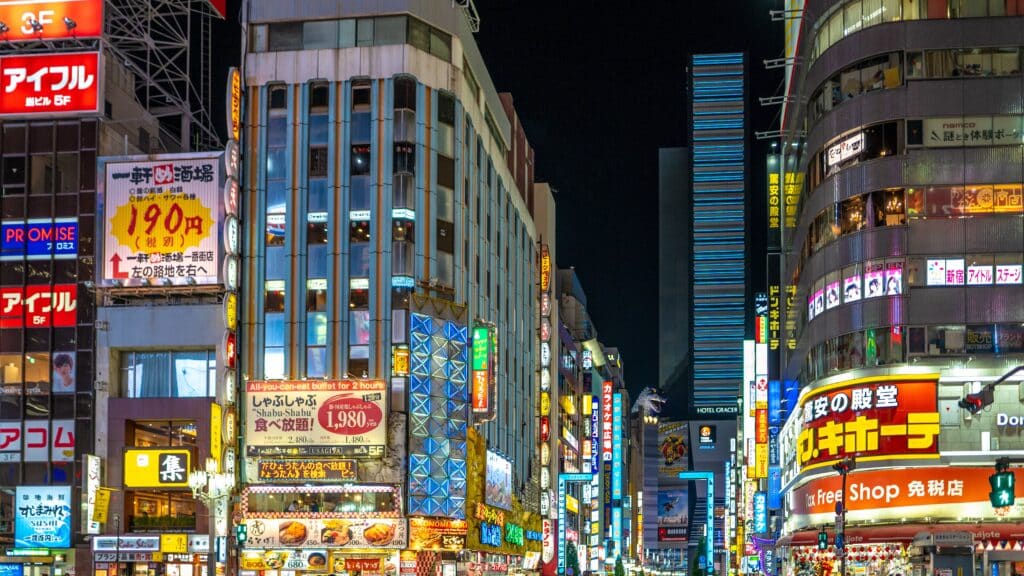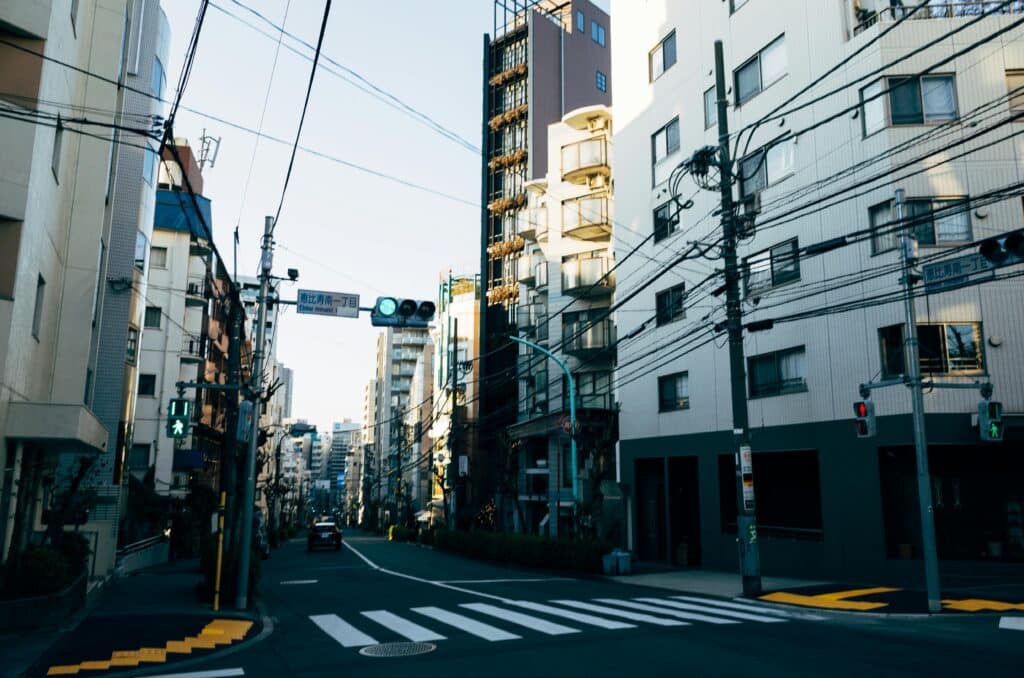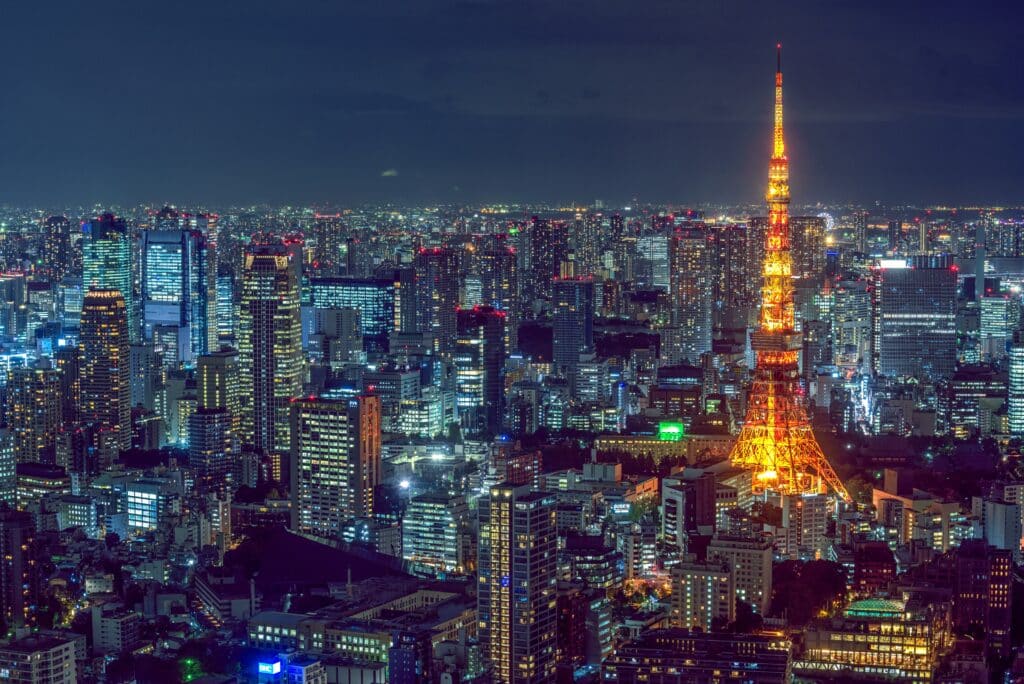
If you’re looking for rental apartments in Tokyo, the hunt can be quite challenging. A dense population and competitive marketplace can make finding the right apartments for rent in Tokyo, Japan, a somewhat difficult task.
The team here at Remitly is here to help you navigate the process from the best neighborhoods and budget planning to the apartment application process, read on to discover how to find rental apartments in Tokyo you’ll love.
Understanding Tokyo’s neighborhoods
Diverse districts and neighborhoods
Tokyo is jam-packed with unique residential areas, including Ginza, a mecca for high-end, upscale dining and shopping. The Roppongi Hills neighborhood is a fun option if you enjoy art museums and a thriving nightlife culture. For those who prefer a bit more peace and quiet, check out the Ebisu and Meguro neighborhoods.
Finding the right neighborhood match should be based on your personal preferences and lifestyle. For example, choose a quieter area if you prefer a laid-back routine, and live in a busier area if you love exploring, shopping, and going out on the town.
Transportation and accessibility
Tokyo has a complex subway system, and aside from walking or biking, it’s how most people living in the city get around. Choose a neighborhood that’s close to a train station and subway lines for easy access. Consider which area will make it easiest for you to commute to work or to reach other important amenities and points of interest.
Budget considerations
While prices vary, the average cost to rent an apartment in Tokyo is approximately 50-70,000 JPY per month or $470-650 USD. Your monthly rental cost will vary depending on your chosen neighborhood, current market conditions, and other factors like the size or number of bedrooms.
It’s important to try to balance the cost with your preferred location. Keep in mind that higher rental prices are common the closer you are to the city center, subway lines, or other major amenities.
Budgeting and financial planning
Rent and utilities
The Tokyo apartment rental market differs from other countries, particularly regarding the required upfront costs. Research different housing styles and neighborhoods before you move to Tokyo to understand better how much you’ll need to budget. It’s also vital to factor in utilities and other additional costs like groceries, Internet services, and transportation.
Initial costs
You’ll likely need to pay several upfront costs before you can rent in Tokyo. Some of these costs include:
- A security deposit is commonly five to six times the cost of your monthly rent.
- “Key money” is a nonrefundable fee that is usually one to two months’ rent. It’s essentially a way to thank the landlord for allowing you to rent their home or apartment.
- Cleaning fees may be added to your rental cost and can cost an extra $282 per month on average.
- Agency fees are common and tend to cost between half to one full month’s rent.
- Some utility companies charge an upfront fee to set up services.

Deciding on rental types
Apartments
Most Toyko apartments are smaller than the average one-bedroom apartment in the United States, for example. The average size of a one-bedroom Tokyo apartment is approximately 430 square feet, compared to the average size of 753 square feet of a comparable space in New York City.
Research several available apartment floor plans and sizes in different areas of the city before you sign a lease. Consider how your furniture and other essential items will fit so you choose a place that’s comfortable and not overcrowded or cramped.
Houses and shared living
Much of Tokyo’s housing is shared, meaning you’ll live in your new place with others. A “share house” is where you rent a single room, a shared room, a semi-private room, or a student housing room-style space.
Guest houses or “gaijin houses” provide affordable options for foreigners who don’t mind sacrificing some privacy in exchange for convenience and affordability.
A major benefit of shared living is that you’ll pay less while getting the opportunity to meet other people from different countries, as well as locals. This living arrangement provides you with a sense of community and friendship. However, lack of privacy and quiet can be a major drawback for some renters.
Furnished vs. unfurnished
Many Tokyo apartments for rent include rooms that are already furnished. This eliminates the need for you to buy new furniture or worry about whether or not your stuff will fit into your new space. However, the rent for a furnished unit may cost 1.5 times more per month, although most furnished apartments don’t charge a key fee or agency fee.
If you want to use your own furniture, consider buying it once you arrive in Japan and find a place. It’s generally much easier, cheaper, and more convenient to buy furniture later than trying to bring it with you or ship it overseas.
Searching for apartments
Online platforms
You can use several popular websites and online platforms to find new properties and available apartments in Tokyo, Japan. Sites like Asumirai, Oyo Life, and Suumo are some examples. You can also check social media groups and online forums to help you save money and find available rentals when you’re ready to move to Tokyo.
Other rental resources
Here are some other ways you can find apartments for rent in Tokyo:
- Work with local real estate agents who are familiar with the area. They can help you find the features that you want within your price range.
- Make sure you understand the role of real estate agencies as well as any fees they may charge you upfront.
- Tap into your personal and professional networks to find out if anyone you know is familiar with renting and living in Toyko apartments.
- Look for recommendations from locals and expats about the best neighborhoods and how to find an affordable place.

Language considerations
Language barrier challenges
You may face some language barriers when you move to Japan since English is limited in the buying and rental market. Here’s how to overcome these challenges to make the process easier:
- Learn and practice the most common Japanese phrases related to apartment hunting.
- Download and use a helpful translation app or service.
- Ask current residents in Tokyo, as well as your bilingual friends and professional associates, for help.
- Collaborate with real estate agents who are fluent in both English and Japanese.
- Make sure your communication expectations are clear and realistic.
Visiting and inspecting apartments
Schedule visits and inspect the property
Before you commit to a new Tokyo apartment for rent, viewing it in person and inspect the properties you’re interested in is crucial.
- Coordinate visiting several apartments with your agent or the property manager.
- Plan efficient apartment tours by scheduling several on the same day, if possible.
- Always check each apartment or guest house carefully and look for any potential issues or needed repairs.
- Make sure you ask the landlord or your agent about things like the building’s age and how well it’s maintained.
- Get out and explore the local neighborhood during your search and apartment inspection visits to assess all the nearby amenities and services.
Document requirements
Once you’ve found the right apartment, gather all the necessary documents to make the application process as easy as possible.
- Prepare your documents, including a valid passport or visa, a photo ID, a letter of employment, pay stubs, and a few month’s recent bank statements.
- Ensure you understand all of your landlord’s specific requirements and review the lease and its applicable terms carefully before signing anything.
- Have your deposit, key money, agency fees, and any other applicable upfront costs ready to give to the landlord.
- Be prepared to negotiate any clauses you don’t understand or don’t like if necessary.
- Obtain a tenant insurance policy (also called fire insurance), which covers the replacement cost of your belongings in the event of theft, a fire, a flood, or other disaster. The policy should also include personal liability coverage.
- Shop around and compare premiums, deductibles, and coverage limits so you find the right coverage for your needs.
Making the final decision
Weighing pros and cons
Before making a final decision on your new Tokyo-Japan apartment, list the most important priorities, along with some deal-breakers. Use this list to help you evaluate which place is the best overall fit for you. Keep your personal preferences in mind, including location, overall cost, and how the apartment fits your lifestyle.
Negotiating terms
Don’t be afraid to ask your agent or landlord if the rent price, lease terms, and other conditions are negotiable. Securing a mutually beneficial agreement before you sign a lease is important. If the landlord won’t budge on something important to you, it might be a sign to look elsewhere.
Submitting the application
Once you’ve found your place, start finalizing the paperwork and submit the application. If you don’t hear back after a few days, follow up with the landlord or the rental agency. Once you’re approved, it’s time to sign your lease and move into your new place.
Conclusion
Tokyo, Japan, is an alluring part of the world. With its rich heritage and unique culture melded with modern-day life and technology, the world’s largest city is one of the most popular places to visit and live in.
Remember these tips when you’re ready to hunt for a fabulous apartment in Tokyo. From understanding common apartment sizes and layouts to knowing about the best neighborhoods and potential upfront costs, advanced preparation will ensure a smooth, stress-free experience.